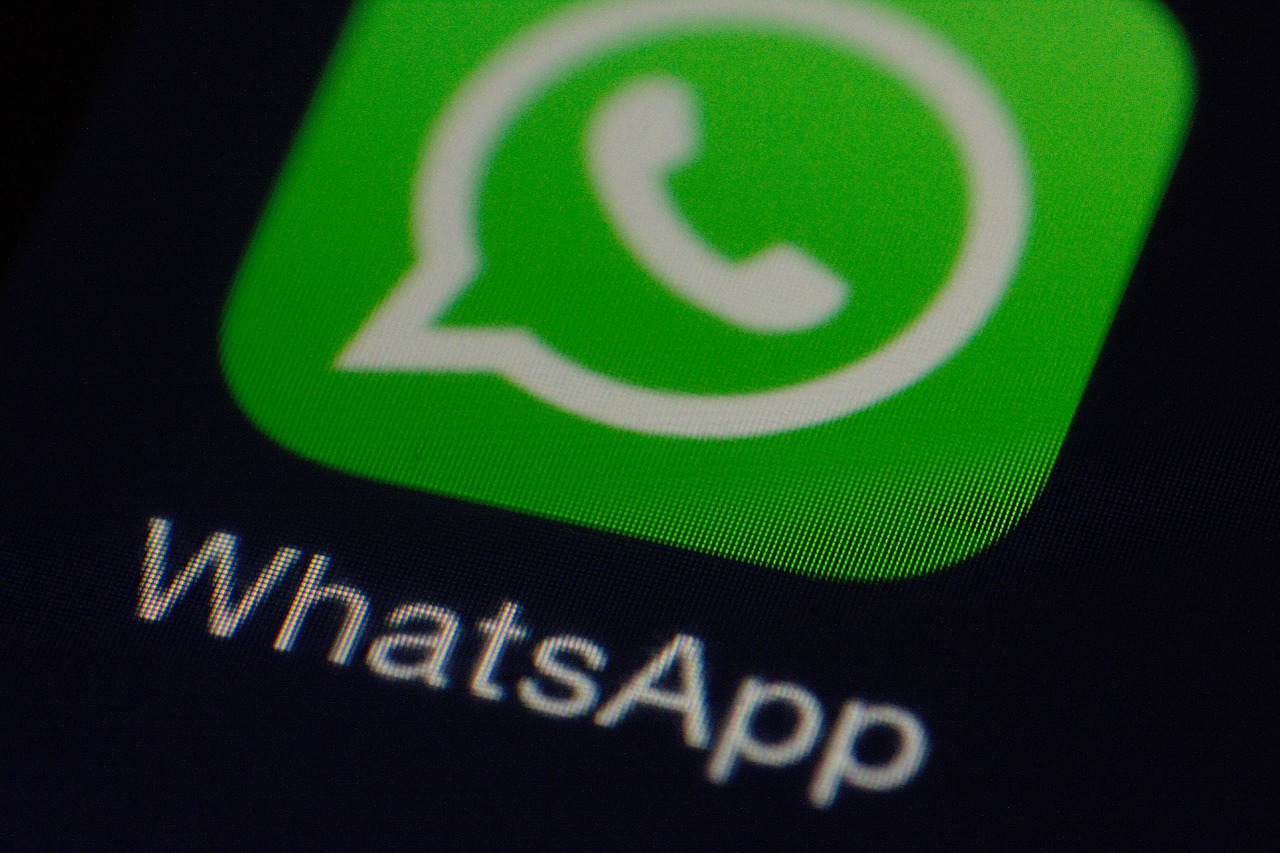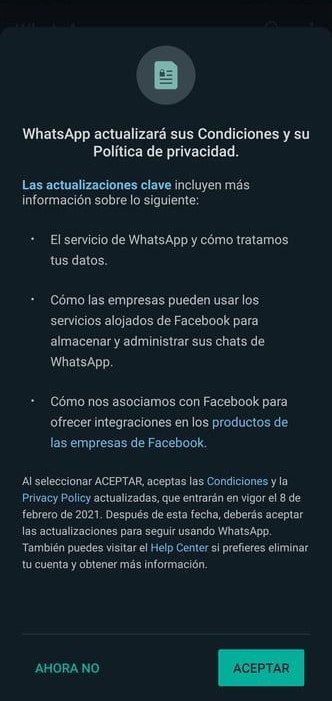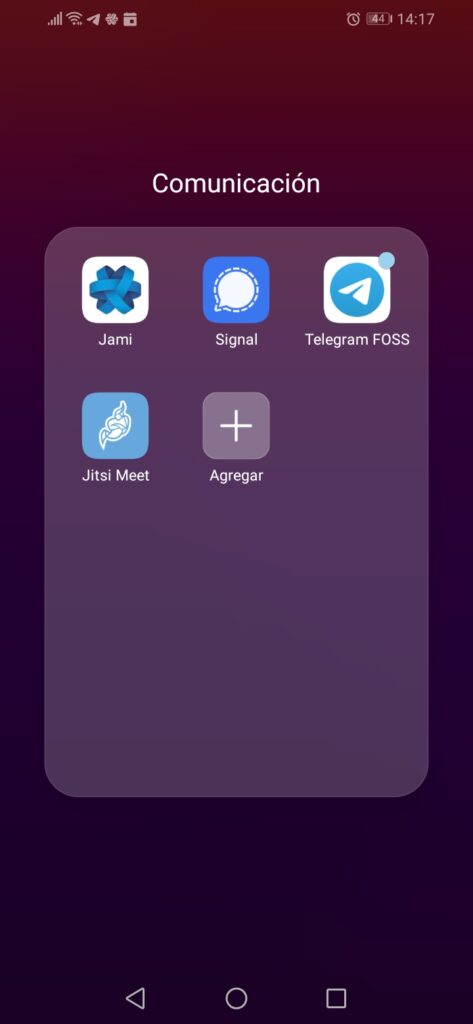January 2021 has already been a month of big international changes, announcements and news.
The one that concerns us in this post is regarding changes in the WhatsApp Terms of Service and Privacy Policy.
Facebook, has had several stumbles in the handling of its users’ information, facial recognition, geolocation, techniques of social experimentation without consent and recently censorship through its platform, during February 2014 Facebook purchased WhatsApp, an emerging platform in the instant messaging communications sector.
Until then, one of the main WhatsApp policies was based on privacy and security “no tricks“, so that it was presented as an option for a market sector that required a more private communication with its contacts compared to what Facebook offers, with this purchase we look with expectation the changes that this would bring.
On January 8, 2021, through a notification from its WhatsApp application, it made public its new changes in Privacy Policy and Terms of Service, otherwise it is necessary to close the account with said service.
- https://www.whatsapp.com/legal/updates/terms-of-service?lang=en (Update: January 4, 2021)
- https://www.whatsapp.com/legal/updates/privacy-policy/?lang=en (Update: January 4, 2021)
Perspective on WhatsApp Business
In our specific case, being WhatsApp Business users, we find that there are more additional implications that we need to pay attention to.
Due to the nature of our services, we have the ethical and legal responsibility to protect the privacy of our clients’ data, the handling of their information is protected by the rights of access, rectification, cancellation and opposition (ARCO).
This point makes us particularly vulnerable to the new WhatsApp privacy terms, where the collection of user meta data as a result of our communication is transferred to Facebook without control of cancellation or opposition.
This case could quickly turn into a legal risk.
Monopoly communication
Additionally, starting in 2021, we have witnessed how unreliable the service can become, due to account closure with no explanation other than “Incurring a violation of the Terms of Service.”
Where the communication with the WhatsApp support appealing the closure includes in their messages a legend that dispels our trust as a communication service with long-term clients.
Important: WhatsApp reserves the right to modify, suspend, or cancel the service for any reason without prior notice and at its sole discretion.
The WhatsApp Support Team (Translated from Spanish)
Recently the administration of WhatsApp responded to the exodus of users through Twitter stating that messages and calls would never be accessible by WhatsApp, however, the issue of the large amount of metadata that is collected at both ends of communication is not addressed.
Some alternatives
We want to be very careful in stating that even when we can recommend options, there is no immutable solution to changes in policy, technological development, or the social environment in which these solutions are developed over time, so it is extremely important to re-visit the terms and conditions periodically to verify that they are understandable, fair, and consistent with the service provided.
Jami, for the tech savvy
Jami is a communication platform that is based on P2P connections, which makes it highly private, unlimited, autonomous and anonymous, however, as well as there are great benefits, such as continuing communication within a local network without an Internet connection.
P2P connections have technical limitations that make the development of communication with multiple users complex, this mainly in text chats, so at the time of writing, even though it is currently under development, there are no chat groups in this platform.
For its use, no phone number is required, just create a user on the network and invite other users to start the conversation, it is available at:
Signal, an ultra private service
From Wikipedia,
Signal (formerly TextSecure) is a free and open source instant messaging and calling application with an emphasis on privacy and security. It can be used to send and receive SMS, MMS and encrypted data messages. By default, the application encrypts the message database on the user’s device, as well as both ends of the communication, in order to protect all messages that are sent to other users.
Wikipedia – Signal_(software)
Operating more like WhatsApp than Jami, this service has the peculiarity that in addition to being developed under the free / open source software model that can be audited, it is managed by an organization founded through subsidies and donations and without data collection for any purpose, the Signal Foundation.
Telegram, the new popular service
We conclude this list, with Telegram a messaging service much more similar to WhatsApp than the previous ones, since it shares a very similar functional and operational structure by basing its development through commercial entities, Telegram FZ LLC and Telegram Messenger Inc.
The main difference with WhatsApp is that its software clients, programs or applications to make use of the service, are developed under a free software and open source model. Which makes the system auditable at least at that level in communication.
With a great similarity in the services offered by WhatsApp, Telegram has positioned itself thanks to the ease of migration to a large number of the market in search of options, recently announced to have exceeded 500 million users.
There are a large number of additional options that can operate as a replacement for WhatsApp with terms and conditions within a non-invasive use policy, however through 2021 and while maintaining a reasonable balance in the use of information in Software, IT & Networks Ltd will use the aforementioned communication channels for interaction with our customers, based on their personal preferences.
Announcing the closure of our WhatsApp account as of February 1, 2021.
We invite you to visit our Privacy Notice and we reiterate at your service.











